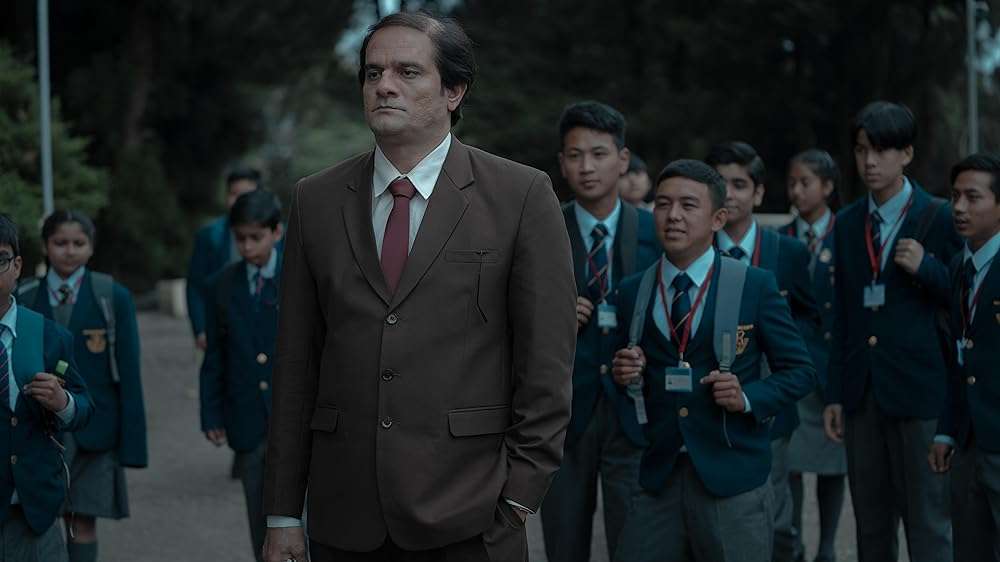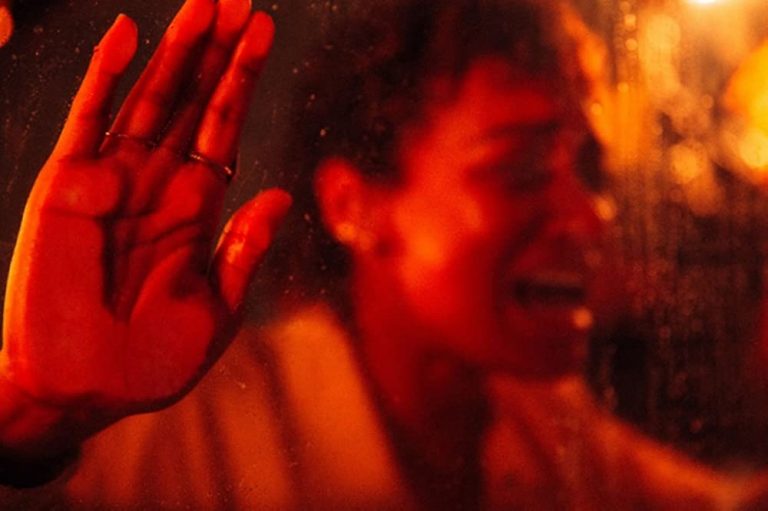Very few movies could disorient me within the first few minutes. Sujoy Ghosh’s “Jaane Jaan (2023)” shares an apparent disconnect with the aesthetic and the muted cinematography being utilized here, concerning the editing being erratic and fast-cut. It’s a strong disconnect because the music and cinematography used gave off the impression that “Jaane Jaan” would be a slow burn. But perhaps the disconnect between two completely separate aspects of filmmaking had a point, and thus, I settled on the filmmaker’s vision as it existed.
As the movie in totality looks, the disconnect within those first five minutes should have been a red flag as to how much of a disconnect the creator had with the source material.
Adaptations themselves are a tricky business anyway. Keigo Higashino’s “The Devotion of Suspect X” has such a uniquely tightly plotted story that it has been unabashedly used in other movies, even if those movies aren’t official adaptations of the source material. So, to criticize a movie as being completely separate from the source material itself is a moot point if looked at in a general context. However, when a movie is advertised as “an official adaptation of the novel,” there are certain expectations. For me, the expectation is whether the point of the source material, the denouement towards which the story is driving, comes forth through the screen.
Looking at “Jaane Jaan” as a standalone mystery without even taking into account that it is an adaptation, Sujoy Ghosh’s latest is sloppy filmmaking at best. It is a movie that knows that it has to be slow-burn and does the usual setup of putting every slow-burn mystery in a hill station. That in itself is tiring, even more so as the movie comes amidst the glut of content released in the web space of procedurals taking place in a hill station. And, to be perfectly honest, the visuals of Kalimpong, at times, are a welcome relief. However, the muted cinematography and the badly lit scenes stand out like a sore thumb.
The story of a math professor acting as a good samaritan to a single mom and her daughter by helping them cover up a murder would have worked very well if suspense or thrill were ever a factor in the equation. Unusually, for a movie about the intelligence of a math professor it never really focuses on the genius of the professor.
As Naren Vyas (Jaideep Ahlawat) explains to Karan Anand (Vijay Varma), the p vs. np problem is the human condition to accept a solution rather than work towards one, thus missing the obvious. Ignoring that one of the big unsolved problems in computer science is simplified in such a trivial manner, the movie, too, expects us to buy into the professor’s genius without showing us how he approaches or solves a math problem. It’s not the “show, don’t tell problem.” It’s rather a choice to tell something so completely ancillary that it does nothing to enhance the story.
A similar problem occurs with the investigator, Karan Anand, played by Vijay Varma. He is shown to be a cocksure, headstrong individual who knows he is good-looking and confident but is also intelligent enough that the Mumbai Police bring him in to search for the missing, corrupt police officer. This police officer happens to be the husband of Maya D’Souza (Kareena Kapoor Khan). He has a chequered past and a very chequered present and had been on the verge of blackmailing her before Maya and her daughter killed him.
The deed was discovered and deduced by Maya’s next-door neighbor, Naren Vyas, who hatches a scheme to help her cover up the murder. Coincidentally, Naren Vyas was a school friend of Karan Anand. So, while Vyas has to deal with Anand doggedly chasing down Maya as the prime suspect, he also has to reckon with Anand’s sound intelligence to understand that Maya’s alibi is so strong that it is suspect. On the other hand, Anand has to fight his growing attraction towards the suspect while being objective about this case.
If “Jaane Jaan” is perceived as a standalone feature, Anand’s character is given enough depth—he is a voracious eater and physically fit and able to fight. Moreover, he is a dogged and skilled investigator and a ladies’ man—he could lead a franchise on his own, and we wouldn’t mind. In the hands of another director, Vijay Varma as Karan Anand would be an interesting character to follow through with. Similarly, Jaideep Ahlawat, while not given much to do, brings in enough pathos and insecurity within his character that he at least can pull off a semblance of “the tortured genius” trope. However, that becomes overly melodramatic as the movie approaches the finish line.

Ghosh’s choice, however, to include the character trait of Vyas being into karate to calm his mind and the final intellectual battle between Anand and Vyas, as shown via a fight scene with stylized action choreography is just baffling and, most importantly, unnecessary. More specifically, the chemistry between Vyas and D’Souza is never believable. Khan might have been given one of the meatier roles in her career. However, she still overacts, with voice modulation so high and extreme that it is never believable, and it stands out especially among performers like Varma and Ahlawat.
But “Jaane Jaan” is not a standalone feature. It is an adaptation of “The Devotion of Suspect X.” And as an adaptation, Ghosh’s choice to streamline three characters into —the physics professor, the police investigator, and the other paramour of the woman— one single character dilutes the entire point of the intellectual battle, which is at the heart of the story itself.
Because Anand has to be Vyas’ rival for Maya’s affection, he also has to be his intellectual rival to decode this investigation. He also has to be invested in it as a police investigator and not simply as a stimulating exercise. Instead of becoming streamlined, it becomes convoluted as a character. And it robs us of the heart of “The Devotion of Suspect X.”.
Rarely has a movie strayed so far from the source material that it completely misses the point and hits the farthest circle from the bulls-eye. “The Devotion of Suspect X” has always been about love being the unpredictable factor in a battle of logic, the missing motivation for the investigator who couldn’t understand why a gifted and logical mind could ever be tempted.
The source material had to deal with that central conflict while also dealing with the math professor having to devote a form of platonic and unrequited love, which unknowingly changed his life. The tragedy of the math professor making the choice and the investigator being unable to comprehend is the heart of the film, and that is completely absent here. No chemistry between Varma and Ahlawat could believably sell you the existing history or the respect these two characters share. And the ending of the movie almost upends the whole point of logic vs. emotion, which the source material always managed to balance.
It brings to mind many questions: Are some movie adaptations completely unnecessary? While the existence of any art form should never be brought into question, watching “Jaane Jaan” leaves you with an existential question: why was this film made?
How could a filmmaker completely remove the central conflict at the heart of the movie and make a police procedural? Having done that, why wouldn’t the movie focus on the procedural aspects of the investigation itself? Why focus on a silly fight scene as an introduction to the investigator character—a physical demonstration for a character about to be involved in a mental battle? Why show that final intellectual battle badly intercut with a fight scene? And why set it on a hill station except to give a convenient explanation for the existence of a heating cord as a murder weapon and to produce a built-in atmosphere of unease, which wouldn’t be used anyway?
The biggest question amidst all of this is: how do you make a thriller so completely inert, with nary a interesting moment, a visual aesthetic, a music cue, or a clever sequence that could move an audience? Like the math problem, which the math professor would spend 15 years on to finally find a solution and might not even succeed, this researcher is also baffled by that question.
The difference is that none of those questions matter. I would rather have this movie blow away in the foggy ether of memory to remove itself from any traces of existence. “Jaane Jaan” is sloppy and inert as a mystery thriller, and as an adaptation, it is abysmal.








![Lookback on Zanussi: Camouflage [1977]](https://79468c92.delivery.rocketcdn.me/wp-content/uploads/2018/03/Camouflage_Zanussi_HOF-768x463.jpg)
